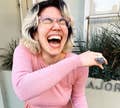
The year I turned 20 was the year I became the sum of a thousand small brown boxes and sleek gray envelopes. Neat, tiny packages of boyshorts in every color with athletic waistbands arrived at my door. A vintage brown leather jacket made its way to me from the 1980s, so authentic I had to cut the shoulder pads out. The used brown leather lace-up boots I would wear for the next three years before they fell apart again and again and again arrived last, in a small box at the end of winter. They were a perfect fit.
The shopping was a ritual. Each time, it went the same way: I ripped open boxes and plastic shipping envelopes and peeled back stickers and seals and marveled at things that felt like the limbs I didn’t realize I’d lost in the war. I tried them on alone and then put them away, pristine and almost untouched, tiny reminders of who I might be — if I could ever decide who that was.
I was the girl who wore a string of oversize pearls with patterned rompers, camisoles and tunics, big floral purses, sundresses, and sweaters. But that year, I put on men’s V-necks and boyshorts and leather jackets and walked over to the bathroom mirror to see if I looked or felt different. I did.
These were the things all the gay girls I was friends with were wearing, as casually and quietly as their own skins. These were the things that separated me from them. These were the things that felt like a secret handshake they used to communicate with one another, or like badges they put on to proclaim who they were to the world. I wanted to feel at home in these things just as easily as I felt at home inside the person I’d been for two decades without ever really thinking about it.
It wasn’t that I couldn’t be gay or queer or confused in my dresses and my pearls, and it wasn’t that I’d never wear them again — because I would. Right then, I needed to be reborn someone else. I needed to be more different than I was alike to that person I’d been for two decades without ever really thinking about it.
So I bought clothes. I tried on being gay, or what felt, at the time, like one of the most surefire ways to look like who I might be. It was dizzying. It was electrifying. Each time I stared at one of the little gifts I’d sent myself, I felt like I was getting closer to finally figuring me out — until a little while later a shadow of doubt would pass over the entire room, and I would feel sick, and pack up my new person, and lie on my bed with my eyes closed questioning everything, especially myself.
Why didn’t I know? How did I wander through deserts of emotion for two decades without ever considering this was my truth? How did I never harbor a secret? How did I never feel a nagging difference within myself?
That year I wished more than anything for a secret. I wished more than anything for a hidden truth inside of me. I wished more than anything that I had always known.
Instead, I had a budding addiction to eBay auctions and a receipt for one set of seven pairs of bright Fruit of the Loom boyshorts, each one rolled up in my underwear cubby just like they were when they arrived.

“I know gay people. I’ve watched shows about gay people. Gay people know.”
I was in my mother’s car when she said it, and we were driving very quickly, and I regretted ever bringing it up. I was still so confused and so scared of myself that I didn’t even use labels or categories when trying to explain it. I just told her all I knew when I woke up that morning: I finally liked someone the way people always told me one day I’d like someone.
“You’re not gay. I’m your mother, and I know you’re not gay.”
I stared out the dashboard window while she wound through suburban streets and wondered — panicked — that she was right.
I had no proof. I was not a card-carrying lesbian. I was just 20 and in love with a woman.

So many of my friends in high school and college were gay. They were people who had fought hard for their identities, who claimed them in the midst of familial rejection, social isolation, the risk of becoming invisible. My friends had harbored same-sex attractions in their hearts for years, struggling with the self-consciousness of recognizing their queerness. Coming out was a mountain to climb for each and every one of them.
I have heard countless coming out stories. Every single time they begin the same way: I’ve always known.
One of my friends fell for the only other gay boy at his high school and tried not to tell another soul. One first kissed another girl before kindergarten in the corner of a classroom. One came to college young, at 16, and wrote his parents a coming-out letter in the middle of the night while we all sat around him. One avoided dating girls, despite being the most popular boy in my high school, and opted instead to date my gay best friend.
That’s how this thing works, I realized over the years. You spend a lifetime tossing and turning and waking up in a cold sweat because of who you are. You are gay because it’s all you’ve ever known you could be. You are gay before you have words for it. You are gay the way you are blonde, or tall, or emotional, or smart. You are gay because you’ve always known.
You are gay because it’s all you’ve ever known you could be. You are gay before you have words for it. You are gay the way you are blonde, or tall, or emotional, or smart. You are gay because you’ve always known.
"How do you know?” my friend Amanda asked me. We were at her apartment in Cleveland Park. I’d just told her I was gay, or more likely that I thought I was gay. I was unable to decide. I was unable to decide for months, but put the words in my mouth and suggested them to people to see if anyone believed me.
“I used to think I had liked all these boys,” I told her. I thought back on them in that moment, on the boys I’d made out with at parties or brought home to group houses. I’d avoided dating altogether in high school and college, which my family and friends rationalized away as my being too finicky, too independent, too smart. But sometimes I ran off and made out with boys in the dark shadows at parties and followed them home, and the next day I’d have a lingering feeling of anxiety that I assumed was excitement in disguise.
A lot of cultural conversations around men and women dating had assured me that tolerating a man was akin to being madly in love with him. So that was what I did — I tolerated them. I tolerated their record collections and their hoodies and their facial hair. I tolerated their boring bedroom walls and their shitty themed parties. I tolerated the sinking feeling in my stomach whenever we were alone. I tolerated the way my entire body tensed up when they came close to touching me or kissing me.
It wasn’t that it felt wrong to be with men: to flirt with them, make out with them, text them the next day. It was just that all that stuff had happened in black and white, or on mute.
After I finally let myself fall for a woman, everything around me was loud. In technicolor.
Liking her was like all those cheesy love songs on the radio playing on repeat. I was finally selfless and open wide and full of energy and light. I was blissed out and lit up. I knew instantly that how it felt to like her was right, was important, was how I could feel forever and ever — if I just redesigned who I was.
“Now I know I never liked anyone,” I said with authority. “Not like this.”
I exhaled and made a mental note of how correct those sentences felt once they were done gnashing against my teeth.

I was 18 the first time we crashed into each other; it would be another two years until the second. Before she kissed me, she asked me if I was going to be OK the next day. I didn’t know what she meant, so I nodded my head. In the morning, I jumped out of bed and frantically put my clothes on, cried a little on the metro, and opened my journal to write over and over again what became my catchphrase in the ensuing few weeks and months:
“I don’t know what it means. I don’t know what it means. I don’t know what it means.”
My best friend Josh sat me down a day later to ask me if I was gay. I opted to say no, insistently. After all, I reasoned with myself, I would know if I were gay. Instead, I packed up my stuff and went home for the summer and forced myself to stop thinking and talking about it. I put what happened between us behind me, as if it was the kind of thing that can fit in the past. As if it wasn’t anything.
I came back to campus in the fall determined to remember who I was. I had strayed, after all, from my vision. I had surrendered control over all the ways I was trying to shape my life, away from all the plans I’d made for myself, and more importantly, away from the plans my family and friends had made with me.
This was not who I was. I heard myself repeat it in my head over and over and over again. It feels stupid in hindsight to admit you thought you knew yourself at 18, but I did. I liked to make lists of different words I would use to describe myself, write passages in my journal devoted to recording the honest definition of my name to an unknown audience.
I was so many things, so many tiny identities and memories collapsed into a skeleton. But I wasn’t gay. That thought had never before crossed my mind. To stumble upon gayness instead of wrestle with it felt inauthentic, impossible. In a world where queer identities aren't always recognized and validated, it didn’t seem like an option to fall flat on my face into one.
I wasn’t gay. That thought had never before crossed my mind. To stumble upon gayness instead of wrestle with it felt inauthentic, impossible. In a world where queer identities aren't always recognized and validated, it didn’t seem like an option to fall flat on my face into one.
In the year after I began chasing boys, this time more earnestly and more devotedly. And eventually, I forgot. The girl who'd asked me if I'd be OK the next morning came out, and I didn’t, and we got over it, water under the bridge, no big deal. My mind erased all the memories from that night, all the times I’d put my head in my hands and felt terrified by my own heart.
Two years later I was 20 and she was my best friend. When she put her hand on my back in a car in the heat of summer, it was like an open wound that just started hurting all over again.

It was so much more a discovery than a declaration.
I wrote poems until I felt like I was ready to form sentences. I closed my eyes and finally dreamt wildly like I’ve always imagined people do when they’re truly alive. I put on the jacket and the boots and the boyshorts and left the house brand new.
I was 20 and I was in love with a woman. This time, I couldn’t push past it or put it behind me. This time it was all-consuming and urgent. This time it was huge, and I would stare in the mirror in the bathroom every morning and look for someone I recognized — but I was gone. I had ceased to exist. I was a blank slate. I was empty and vast and stupid and overwhelmed.
Sometimes, I crumbled under that canvas. Other times, I filled it with light and let myself believe I’d eventually get to know myself all over again.
It was easy to put words to the feelings alone. I am in love with a woman. Over and over again. That was the easy part. That was the part nobody could take away from me.
What came next was deciding what that meant. It was the truth that would come to define the rest of my life, but I was bewildered by it. What if I was wrong? I knew it was a ridiculous question, that the only person who knew me best should be me, but I couldn’t shake the feeling that somewhere in my confusion, in having opened my eyes for what felt like the first time, I was going to make a mistake.
I kept a journal that year in a small red paperback Moleskine. On the front, I wrote "Everything will change." Inside, I wrote a line from a song: "Live through this and you won’t look back."

What if it isn’t always about “coming out?” What if I was never hiding? What if being gay isn’t about the pain of keeping that secret? What if it’s about the way my girlfriend smiles while she drives me down the highway, or how smooth the movements of the Earth underneath me felt when I finally wore those boots outside?
What if being gay is about recognizing that you, against all odds, aren’t broken, that where you thought there was nothing there’s a well of love, that inside of you is an awesome power to become something you never imagined for yourself?
Maybe it’s possible to wake up someone else.
Maybe it’s possible to wander through the world for two decades without ever being able to recognize yourself in your reflection.
Maybe it’s possible to be 20 and fall in love with a woman and never look back.

One of the first books I bought when I was packing virtual shopping carts full of my feelings was The New Fuck You, a poetry anthology edited by Eileen Myles. One of my favorite lines was from a piece by Holly Hughes:
I spent my entire childhood in a coma. Then I turned twenty and I kissed a woman.
I underlined it and earmarked the page and put the book on my bedside table, just to remind myself I had a story that had been written before.
